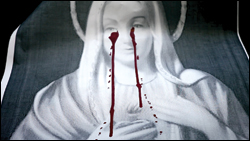Mea Maxima Culpa: Silence in the House of God
By Justin Chang
An HBO Documentary Films presentation of a Jigsaw production, in association with Wider Films Projects and Below the Radar Films, with the participation of Irish Film Board. Produced by Kristen Vaurio, Alex Gibney, Alexandra Johnes, Jedd Wider, Todd Wider. Executive producers, Lori Singer, Jessica Kingdon, Sheila Nevins. Co-producer, Sloane Klevin. Directed, written by Alex Gibney. With: Terry Kohut, Gary Smith, Pat Kuehn, Arthur Budzinski, Jeff Anderson, Rembert Weakland, Thomas Doyle, Richard Sipe, Patrick J. Wall, Geoffrey Robertson, Laurie Goodstein, Jason Berry, Robert Mickens, Marco Politi. Voices: Jamey Sheridan, Chris Cooper, Ethan Hawke, John Slattery. Narrator: Alex Gibney. (English, Italian, American Sign Language dialogue) Weaving a uniquely devastating account of priestly pedophilia into an excoriating indictment of the entire Vatican power structure, "Mea Maxima Culpa: Silence in the House of God" is an expansive and authoritative study of the widespread practice and concealment of sexual abuse within the Catholic Church. Alex Gibney's typically well-assembled, meticulously researched docu occasionally falters with over-aestheticized reconstructions of his subjects' experiences, an unnecessary touch in light of their brave, chilling testimony and the horrific scope of the personal and institutional corruption conveyed here. Hard-hitting synthesis of established facts and new interviews merits theatrical exposure before its 2013 HBO airings. With a staggering arsenal of interviews, documents and archival materials at his disposal, Gibney digs deep into the case of Lawrence Murphy, a priest alleged to have abused more than 200 boys while teaching at St. John's School for the Deaf in Milwaukee from 1950-74. Four alums -- Terry Kohut, Gary Smith, Pat Kuehn and Arthur Budzinski -- recall in sign language about how Murphy repeatedly molested them well into their teenage years, painting an angry picture of how their disability rendered them especially vulnerable to the misdeeds of a trusted leader and made it even more difficult for them to tell others what was going on. The men strike a heroic note when they describe how, in a fit of determination and desperation, they slapped Murphy's face on hand-drawn "wanted" fliers and circulated them around the school and neighboring community. Yet the courageous gesture came to naught as the boys' claims were cursorily investigated but largely ignored by Milwaukee cops and legal officials, many of them Catholic. One of the film's unmistakable conclusions is that no parish in the '60s and early '70s was prepared to accept the notion that a priest, let alone thousands worldwide, could be capable of such grievous wrongdoing. Gibney fans out to interview psychological experts, human-rights attorneys, Catholic journalists and even ex-clergymen who offer piercing insights into the systemic nature of abuse and cover-up within the Church. Richard Sipe, a mental-health counselor and former Benedictine monk, illuminates the twisted nature of "noble-cause corruption," explaining how a priest could convince himself that his acts of abuse were in fact acts of consecration, supposedly cleansing his victims of their adolescent lusts by stimulating them sexually. Patrick J. Wall, now an expert witness on behalf of abuse victims, describes how he once worked as a Church "fixer," paying out large settlements in exchange for strict confidentiality agreements and seeing that offending priests were not defrocked, but simply moved to other parishes and/or treatment centers. Silence, as referenced by the title, is a key theme here, applying to not only the communication barrier the boys of St. John's found themselves up against, but also the Church's code of secrecy and disavowal of accountability. A thoroughly damning portrait emerges of an arrogant, unfeeling institution that sees its authority as absolute; that invokes canon law in order to hush up scandals and excommunicate those who would bring the truth to light; and that shows greater mercy toward its perpetrators than toward those who suffered at their hands. The documentary reserves its most withering attack for the Vatican itself (none of whose officials agreed to be interviewed), advancing an exhaustively detailed argument that Pope Benedict XVI is the single most knowledgeable figure on the Church's history of sexual abuse, yet has done far too little to reach out to victims or to bring violators to justice. There are moments when Gibney's impeccable production values threaten to undercut his points; most ill-advised are the soft-focus re-creations of Murphy's crimes, all hellish red backlighting and horror-movie music, backed by testimony that requires no such dramatic embellishment. For those who have followed the scandal since the Boston Globe's groundbreaking coverage in 2002, or who have seen Amy Berg's superb 2006 documentary "Deliver Us From Evil," "Mea Maxima Culpa" will play not as a revelatory expose so much as a dispiriting reiteration of known truths. Yet it remains a powerful, necessary contribution to a chilling body of reportage that, one senses by film's end, has just begun to take stock of the human costs of a monstrous conspiracy. Camera (color/B&W, HD, 8mm), Lisa Rinzler; editor, Sloane Klevin; music, Ivor Guest, Robert Logan; music supervisor, John McCullough; production designer, Markus Kirschner; art director, Gonzalo Cordoba; costume designer, Christine Field; sound, David Hocs; sound designer, Bill Chesley; supervising sound editor, Allan Zaleski; re-recording mixer, Tony Volante; associate producers, Eimhear O'Neill, Laurie Goodstein; assistant director, Fred Blankfein; casting, Adine Duron. Reviewed at Toronto Film Festival (TIFF Docs), Sept. 8, 2012. Running time: 107 MIN. Contact Justin Chang at justin.chang@variety.com
|
.
Any original material on these pages is copyright © BishopAccountability.org 2004. Reproduce freely with attribution.
